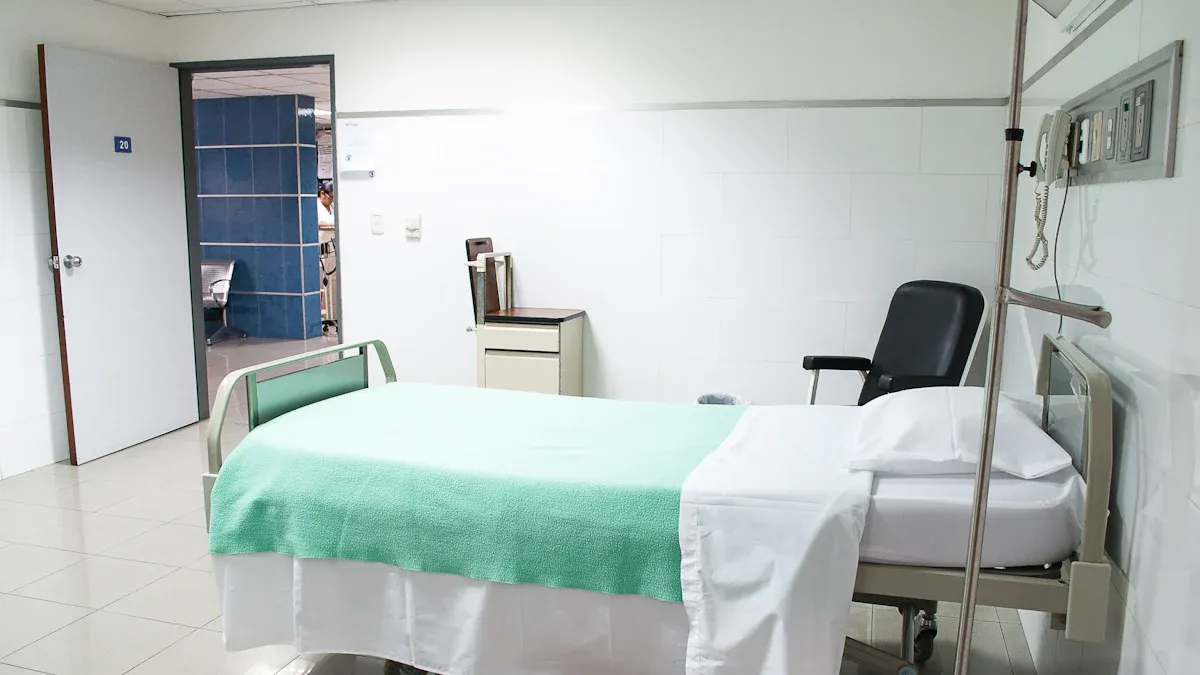Contents

The medical battery definition refers to a situation where a healthcare provider intentionally performs a physical procedure or makes contact with a patient without their consent. This act infringes on a person’s autonomy and disregards their fundamental right to make decisions about their own body. Informed consent is crucial in safeguarding these rights. Research indicates that over 30% of claims related to informed consent stem from a failure to disclose potential risks or adverse effects of procedures. Although many healthcare professionals adhere to proper practices, a notable number still fall short. This underscores the importance of clear communication and respect for patient choices in medical care.
Key Takeaways
Medical battery happens when a doctor does something without your permission. Always make sure you know and agree to any medical procedure.
Giving informed consent is very important. It lets you stay in control and know the risks and choices before treatment.
Write down all talks with your doctor. Save copies of consent papers and notes to protect yourself.
Doctors must get clear permission and explain things well. This helps build trust and avoids problems that could cause legal trouble.
If you think medical battery happened, write down what occurred and talk to a lawyer. Acting quickly can protect your rights and make doctors responsible.
Medical Battery Definition and Key Elements
What Is Medical Battery?
Medical battery occurs when a healthcare provider intentionally performs a procedure or makes physical contact with you without your consent. This legal concept emphasizes your right to control what happens to your body. Across jurisdictions, medical battery includes situations where a provider performs a procedure you did not agree to or changes the agreed-upon procedure without informing you. For example, California Civil Code § 3294 allows punitive damages for intentional harm, while the case Cobbs v. Grant (1972) highlights the importance of informed consent in distinguishing medical battery from malpractice.
The origins of medical battery trace back to common law principles of bodily autonomy and consent. Historically, it evolved from the writ of trespass, which protected individuals from unauthorized physical contact. The Tennessee Supreme Court first recognized medical battery in Butler v. Molinski, establishing its legal foundation.
Key Elements of Medical Battery
Lack of Patient Consent
Consent is the cornerstone of ethical medical practice. Without it, any procedure or physical contact can qualify as medical battery. For instance, if a provider performs a surgery you explicitly refused, it violates your autonomy and legal rights.
Intentional Act by the Healthcare Provider
Medical battery requires intent. The provider must knowingly perform the act without your permission. This distinguishes it from negligence, where harm may occur unintentionally.
Physical Contact or Procedure Performed
The act must involve physical contact or a medical procedure. Even if the contact does not cause injury, it can still be considered harmful or offensive if it violates your dignity or autonomy.
Why Consent Is Crucial in Medical Practice
Consent ensures that you remain in control of decisions about your body. It arises from a fiduciary duty, where the provider must share sufficient information about treatments, alternatives, and risks. Without informed consent, providers risk legal consequences, including malpractice claims. The 1914 case of Schloendorff v. Society of New York Hospital set a precedent by affirming that every adult has the right to decide what happens to their body. This case remains a cornerstone of medical ethics and patient rights.
“Informed consent is not just a legal requirement; it is a moral obligation that respects your autonomy and dignity.”
Examples of Medical Battery

Real-World Cases
Performing a surgery without patient consent
Imagine agreeing to a minor surgical procedure, only to wake up and discover that something entirely different was done. This happened in a 2014 case where a patient consented to a minimally invasive surgery to remove a small mass. However, the surgeon removed a much larger mass without informing the patient, leaving him impotent. The jury awarded $9.25 million in noneconomic damages, emphasizing the importance of obtaining fully informed consent. This case highlights how medical battery differs from malpractice—it involves intentional actions without your permission, even if the provider believes the outcome is beneficial.
Administering a treatment the patient explicitly refused
Medical battery also occurs when a healthcare provider administers a treatment you have clearly declined. For example, if you refuse a specific medication due to personal or religious beliefs, and the provider administers it anyway, this violates your autonomy. Such actions can lead to legal consequences, as they disregard your right to make decisions about your own body.
Hypothetical Scenarios
Changing a procedure during surgery without prior consent
Picture this: you consent to a specific surgery, but during the procedure, the surgeon decides to perform an additional operation without consulting you. Even if the surgeon believes the change is necessary, this constitutes medical battery. Your consent is required for any deviation from the agreed-upon plan unless it’s a life-threatening emergency.
Conducting an unnecessary physical exam without explanation
Another example involves a healthcare provider performing a physical exam that you did not authorize or that is unrelated to your treatment. For instance, if you visit a doctor for a routine check-up and they conduct an invasive exam without explaining its purpose, this could qualify as medical battery. Such actions breach the trust between you and your provider and may result in legal action.
🛑 Note: Always ensure you understand and agree to any medical procedure before it is performed. Asking questions and documenting your consent can help protect your rights.
Legal Implications of Medical Battery
Consequences for Healthcare Providers
Civil lawsuits and monetary damages
Healthcare providers found guilty of medical battery often face civil lawsuits. Victims may seek monetary damages for the harm caused. These damages can include compensation for medical expenses, emotional distress, and punitive damages. Civil lawsuits not only impose financial burdens but also highlight the provider’s failure to respect patient autonomy.
Professional disciplinary actions
Medical battery can lead to severe professional consequences. Providers may lose their medical licenses, face fines, or even imprisonment in extreme cases. The following table outlines the most common legal consequences:
Consequence | Description |
|---|---|
Loss of medical license | Healthcare providers may lose their ability to practice. |
Damage to reputation | Being found guilty can severely harm a provider’s reputation. |
Civil lawsuits | Victims may file lawsuits seeking damages. |
Criminal charges | Providers may face criminal prosecution. |
Fines | Financial penalties may be imposed. |
Imprisonment | In severe cases, imprisonment may occur. |
Legal Outcomes for Patients
Compensation for physical and emotional harm
As a patient, you may receive compensation for both economic and non-economic damages. Economic damages include medical expenses, lost wages, and loss of earning potential. Non-economic damages cover intangible losses such as pain, emotional distress, and reduced quality of life.
Economic damages:
Medical expenses
Lost wages
Loss of earning potential
Non-economic damages:
Physical pain and suffering
Emotional distress
Disfigurement
Reduced quality of life
Legal recognition of patient rights
Winning a medical battery case reinforces your rights as a patient. It sends a clear message that healthcare providers must respect patient autonomy and obtain informed consent. This recognition empowers you and others to demand ethical medical practices.
Statutes of Limitations and Legal Processes
Filing a medical battery lawsuit involves specific procedural steps. You must act within the statute of limitations, which varies by jurisdiction. To strengthen your case, follow these steps:
Document the Incident: Record details such as the date, location, and individuals involved.
Request Your Medical Records: These records can verify the procedures performed and whether you provided consent.
Consult a Legal Professional: An attorney can evaluate your claim and guide you through the process.
Report the Incident: File a complaint with the state medical board if ethical violations occurred.
Take Legal Action: Seek damages for medical costs, emotional distress, and punitive damages if applicable.
📝 Tip: Acting promptly and gathering thorough documentation can significantly improve your chances of a successful outcome.
Medical Battery vs. Medical Malpractice
Key Differences
Intentional acts in medical battery
Medical battery involves intentional actions by a healthcare provider. For example, performing a procedure without your consent or conducting a different procedure than what you agreed to qualifies as medical battery. The provider’s intent to act without your permission is the key factor, even if they believe the outcome benefits you.
Negligence in medical malpractice
Medical malpractice, on the other hand, arises from negligence. This occurs when a provider fails to meet the standard of care expected in their profession. Unlike medical battery, malpractice does not involve intentional actions. Instead, it focuses on whether the provider’s carelessness caused harm. For instance, a surgeon leaving a tool inside your body during surgery would be considered malpractice.
Key takeaway: Medical battery centers on intentional unauthorized actions, while malpractice focuses on unintentional negligence.
Legal Standards and Burden of Proof
The legal standards and burden of proof differ significantly between medical battery and medical malpractice. In medical battery cases, you must prove that the provider intentionally performed an act without your consent. The focus is on whether the contact was unauthorized, not whether it caused harm.
In contrast, medical malpractice requires you to demonstrate that the provider breached their duty of care. This involves proving negligence, which often requires expert testimony to establish the standard of care and how it was violated. The table below highlights these differences:
Aspect | Medical Malpractice | Medical Battery |
|---|---|---|
Legal Standard | Requires proof of negligence | Focuses on unauthorized contact |
Burden of Proof | Must show breach of duty of care | Must prove intentional contact without consent |
Consent | Patient must consent to treatment | Patient must not have consented to treatment |
Expert Testimony | Often required to establish negligence | Not required, focus is on intentionality |
Illustrative Examples of the Distinction
Understanding the distinction between medical battery and medical malpractice becomes clearer with examples. If a provider performs a procedure you explicitly refused, this constitutes medical battery. Similarly, conducting a substantially different procedure than what you consented to, such as removing the wrong organ, also qualifies as battery.
In contrast, medical malpractice involves errors or omissions due to negligence. For instance, prescribing the wrong medication or failing to diagnose a condition in time would fall under malpractice. These examples highlight how intent and negligence differentiate the two concepts.
🛑 Note: Always ensure you understand the procedures you consent to and ask questions if anything seems unclear. This can help protect your rights and prevent misunderstandings.
Patient Rights and Prevention of Medical Battery

Protecting Patient Rights
Understanding informed consent
Understanding informed consent is essential for protecting your rights as a patient. It ensures you have control over your medical care. Before any procedure, your healthcare provider must explain the treatment, its risks, and possible alternatives. This allows you to make an informed decision about your care. For example, if a doctor suggests surgery, you should know why it’s necessary, what could go wrong, and whether other options exist. By staying informed, you reduce the risk of misunderstandings and protect yourself from unauthorized procedures.
Asking questions and documenting communication
Asking questions is one of the most effective ways to safeguard your rights. If something seems unclear, don’t hesitate to ask for clarification. For instance, you might ask, “What are the risks of this treatment?” or “Are there other options available?” Documenting these conversations can also help. Write down key points or request written summaries from your provider. This creates a record of what was discussed and ensures you have proof of your consent.
📝 Tip: Always keep copies of signed consent forms and any written communication with your healthcare provider.
Preventing Medical Battery as a Healthcare Provider
Obtaining clear and documented consent
As a healthcare provider, obtaining clear and documented consent is crucial. Always ensure patients understand the procedure and agree to it. Use signed consent forms or verbal confirmations to document their approval. This protects both you and your patients from potential disputes. For example, before performing surgery, confirm that the patient has signed the consent form and understands the procedure fully.
Communicating openly with patients
Open communication builds trust and prevents misunderstandings. Sit down with patients during consultations to create a more personal connection. Use plain language to explain medical terms and procedures. Avoid jargon that might confuse them. Encourage patients to ask questions and express concerns. For instance, asking, “Do you have any questions about this treatment?” shows that you value their input and want them to feel comfortable.
Role of Policies and Training in Healthcare Settings
Healthcare facilities play a vital role in preventing medical battery. Policies should emphasize the importance of informed consent and patient autonomy. Regular training sessions can help staff understand these principles and apply them in practice. For example, training programs might teach providers how to communicate effectively, obtain consent, and respect cultural differences. Hiring interpreters and culturally competent staff ensures all patients receive equitable care. These measures create a safer environment for everyone.
✅ Reminder: Strong policies and ongoing education reduce the risk of medical battery and promote ethical medical practices.
Medical battery highlights the importance of informed consent and your right to make decisions about your body. As a patient, understanding your rights and asking questions ensures you stay in control of your care. Healthcare providers must prioritize clear communication and obtain consent to avoid legal issues.
🛡️ Tip: Trust and transparency between you and your provider create a foundation for ethical and lawful medical practices. By fostering this relationship, you can ensure your autonomy is respected and protected.
FAQ
What should you do if you suspect medical battery?
Start by documenting everything, including dates, procedures, and conversations. Request your medical records to verify what was done. Consult a legal professional to evaluate your case. Reporting the incident to the state medical board can also help address ethical violations.
Can medical battery occur during emergencies?
In emergencies, providers may act without consent to save your life. However, if the situation isn’t life-threatening and they proceed without your approval, it could qualify as medical battery. Always clarify your wishes in advance when possible.
How does informed consent protect you?
Informed consent ensures you understand the procedure, its risks, and alternatives. It gives you control over your medical care. Without it, any unauthorized action violates your autonomy and may lead to legal consequences for the provider.
Is medical battery common in healthcare?
Medical battery is less common than malpractice but still occurs. Cases often involve unauthorized procedures or treatments. Understanding your rights and asking questions can reduce the risk of experiencing it.
Can you sue for medical battery if no harm occurred?
Yes, you can sue even if no physical harm occurred. Medical battery focuses on unauthorized contact or procedures, not the outcome. Courts recognize the violation of your autonomy as sufficient grounds for legal action.
🛡️ Tip: Always ask questions and document your consent to protect your rights as a patient.





